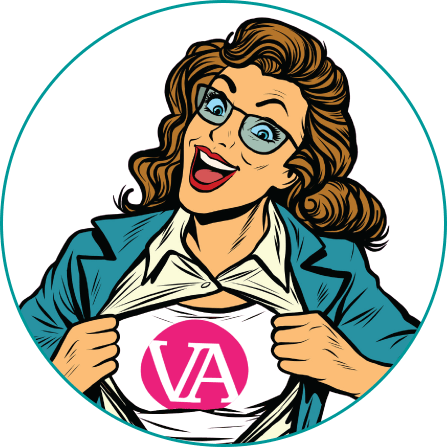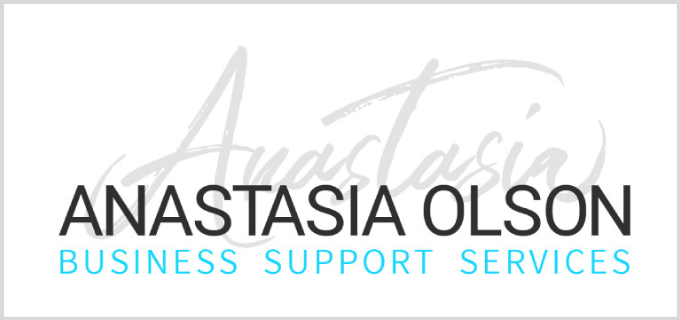This is a Virtual Assistant case study and interview with Anastasia Olson. Anastasia lives in a suburb of Vancouver, British Columbia, Canada and set up her VA company offering business support services in 2016. This is the story of how she got started, who she works with and whether she would do anything differently if she had to start again.
What did you do for a living before you became a VA?
Starting in late 2012 I was focusing on building my silversmithing business full-time. Prior to that, I spent over 20 years working as a legal administrative assistant.
When did you first hear about VAs or became aware they even existed?
I think I first heard the term “virtual assistant” in or about mid-2015. A couple of my jewellery designer friends brought it up, and I thought “What the hell is a VA?!” – I had a hard time wrapping my head around how on earth someone could do secretarial/admin work remotely.
Of course, I was mainly picturing the things that either cannot be done from a distance or which would be logistically complicated if attempted from a remote location: filing paperwork, organizing the boss’s office, dealing with incoming mail, filing court documents, handling courier shipments, etc.
What was the trigger for you becoming a VA?
My marriage ended in the autumn of 2016. I had been self-employed and working from home for a few years by that point, and back in 2012 when I left the legal world I knew that whatever happened next, it had to be something different because that career had been slowly sucking the life right out of me.
Did you just leave your job or start VA-ing gradually?
I started doing VA-type work pretty organically. While I was trying to figure out my next move after my marriage broke down, I started doing a few things for some of my jewellery designer friends: proofreading/editing, photo editing, graphic design.
About 5-6 weeks into it, I suddenly realized “Hey, I think I’m a VA now! So this is what that looks like… Okay, let’s see where this goes.”
Where did you find the help or advice you needed when setting up?
I had a brief chat with the VA for someone I knew locally, to get a general idea of the types of tasks she handled. To be honest, she wasn’t particularly helpful or “welcoming”; I think she might have felt I was competition, which is a bit ridiculous since she was well-established and I was just starting out.
Then I joined a few VA-related groups on Facebook. I quickly realized that most of them were of little value to me, and I’ve exited those ones – the VA Handbookers Facebook group is where I hang out, as I’ve found it to be the most knowledgeable bunch!
Who was your first client and how did you get them?
My first clients were fellow jewellery designers because they were my immediate circle at the time. They all knew my legal background and knew I was a huge grammar nerd with excellent attention to detail, so it was all very organic – they needed some help, and I was right there among them.
Do you have a niche?
So far I haven’t really established a specific niche, with either industry or services. However, this past year I have focused my messaging a bit more, towards business coaches, and more recently to podcasters.
This is mainly when I’m in networking meetings, however – in my social media I don’t really name who I’m ‘talking to’, other than using terms like ‘business owner’ and ‘entrepreneur.’
How would you say you were different from other VAs?
Perhaps the fact that I have both an extensive administrative background that brings with it a lot of techie knowledge, as well as strong creative tendencies.
Because of my experience as a jewellery designer, I’m uniquely qualified to work with product-based business owners because I speak the same language and already know a lot of what they need.
Also, it has definitely been helpful to already have some experience with self-employment, with various systems and resources already in place such as business bank account and credit card, full-fledged accounting system, etc.
 What’s the best thing about being a VA?
What’s the best thing about being a VA?
Being able to set my own schedule and not having to get up at the crack of dawn in order to be at the office before 9 am.
In 2009 I was diagnosed with narcolepsy (which means I have no idea what “restful sleep” actually means); so no longer being a slave to the alarm clock is huge.
I still have a routine that I stick to, but it now involves usually getting enough sleep that I’m not walking around like a literal zombie all day.
What’s the hardest thing about being a VA?
Being self-employed in any industry comes with a bit of Imposter Syndrome, which can creep in at inopportune moments, and sometimes when you least expect it.
The uncertainty of income (specifically, the potential – or actual – lack thereof) can be pretty stressful at times, but in both cases, that’s when you just have to pick yourself up, shake off the Negative Nelly moments, and get out there and network!
How virtual are you?
I’ve worked onsite with ONE client only, but that was a special case. It started as a legacy project, scanning and organizing her terminally-ill husband’s family photos in order to create a hardcover photobook for future generations.
After her husband’s death, I helped her pack up her entire (rather large) house so everything could be put into storage, after which she went travelling.
Other than that one client, I work 100% remotely.
If I’m working with someone who lives within the Greater Vancouver area I may occasionally meet them for coffee – but only if it’s convenient for me.
I don’t have a vehicle, so if I can combine the meeting with running errands and they’re able to come to my area, I’ll agree to meet in person. Otherwise, any meetings are done via Zoom.
How do you find your clients?
Almost entirely through networking and referrals. I don’t go out prospecting – I build relationships with people, and the discussions about outsourcing happen in their own time.
It’s definitely the long game, but it doesn’t leave me feeling sleazy and sales-y, which is very important to my sanity.
How do you manage your personal/work life balance?
I’m fairly introverted, so I don’t have a ton of social commitments – and certainly much less during the pandemic!
Business-wise, I make sure that timelines and schedules are realistic and establish boundaries with clients so that they know that if they email me in the evening, they won’t get a response until the next day.
I don’t use my mobile for email or social media, and close email on my computer by about 7 pm.
How do you manage your clients, their work and their expectations?
Maintaining good communication is key. Keeping clients up-to-date with what I’m working on, how much time is left on their package/retainer and poking them when there’s something that they need to handle.
I tell my clients at the beginning my preference for how to communicate with me and I find email is best (rather than a combo of email, text, Facebook Messenger, etc) as that way, everything stays in one place.
What technology, websites, or apps are invaluable to your working life?
Photoshop or Photopea), accounting software (can’t imagine doing all that stuff with just spreadsheets!), MS Office, Google Suite, WordPress. LastPass. Zoom and my appointment scheduling app – whatever it happens to be; I’ve changed a couple of times, but it’s invaluable!
I originally just set up appointments manually, but of course, that comes with a ton of back-and-forth to find a mutually agreeable time, and it’s a ridiculous waste of time.
Would you do anything differently if you had to start again?
If I had found the VA Handbookers group earlier (I think I was already about a year in when I joined the group), I probably would have bought the DIY VA course.
What advice would you give to someone considering becoming a VA?
From my perspective, I think it definitely helps if you have at least a little bit of admin experience, if only because it often teaches you certain skills that become second nature – like the ability to quickly teach yourself how to use various systems and software.
That being said, depending on the types of services you plan to offer, that background wouldn’t be strictly necessary.
The bottom line is: focus on what you already know!
Make a list of ALL your skills (whether or not you think they’d be relevant), and then cross out all the stuff that you don’t actually enjoy.
When you narrow down the list, picture yourself doing the remaining things over and over (and over again), and then ask yourself if you’d still enjoy them. If there are any “Nope!” answers to that question, cross those out too.
Also, don’t worry so much about what other VAs charge. There are averages in the industry but they’re different depending on where you live.
Figure out what you need to charge to cover all your expenses and make a little profit, and then modify that based on your experience, skill sets, etc.
And don’t stress out about networking meetings.
As an introvert myself, I totally get that it’s nerve-wracking, but trust me: it gets easier the more you do it! Write out your introduction and practice it beforehand.
It’s especially easy with everything being online these days – you can have a well-crafted one-minute speech written out, so you don’t have to worry about your mind going blank (been there done that).
I attend networking meetings every week, and I change my intro for every meeting because when you’re frequently with the same people, you definitely need to change it up or they quickly learn to tune you out – and you don’t want that.
Connect with Anastasia Olson on Facebook.
Wanna be a Virtual Assistant?If you were inspired by Anastasia’s story then sign up for my flagship DIY VA course and start your own journey today. With lifetime access and an incredible trainee-only support group, I hold your hand through the entire process and support you all the way. |
 |





Thank you so much for sharing your experiences. This has been a very inspiring read. I am on the cusp of diving into a V/A career following redundancy after 20 years in the office. I know I can do it but it’s tough sometimes to ignore the old imposter syndrome!